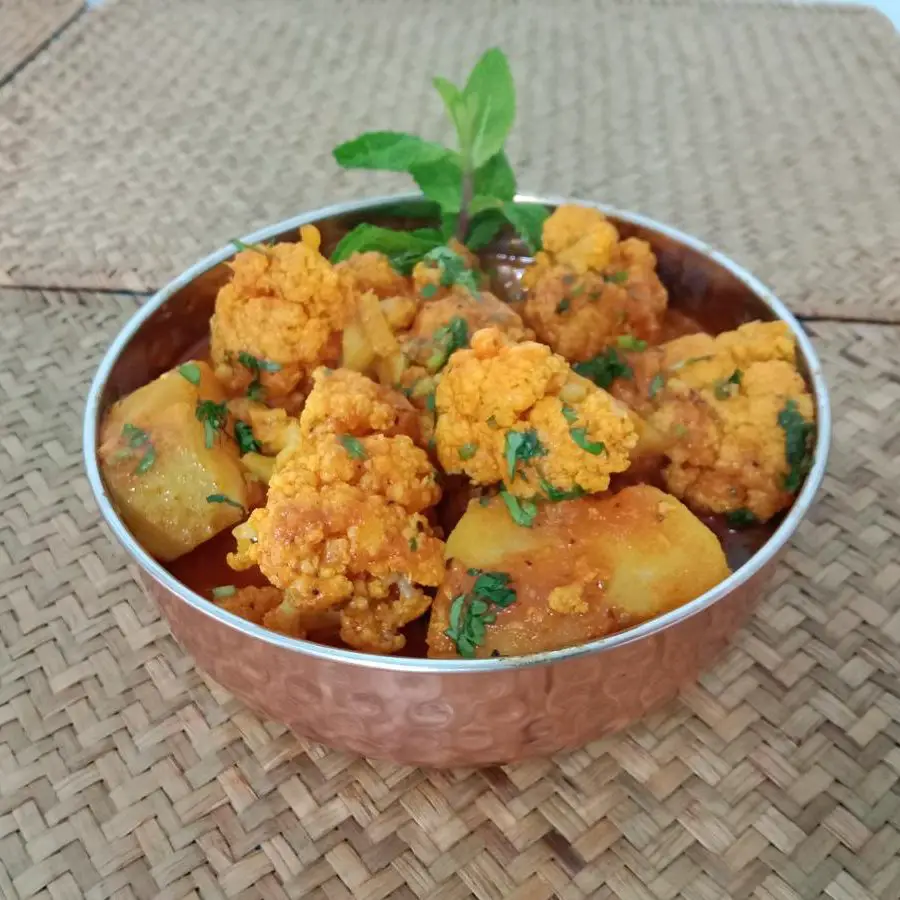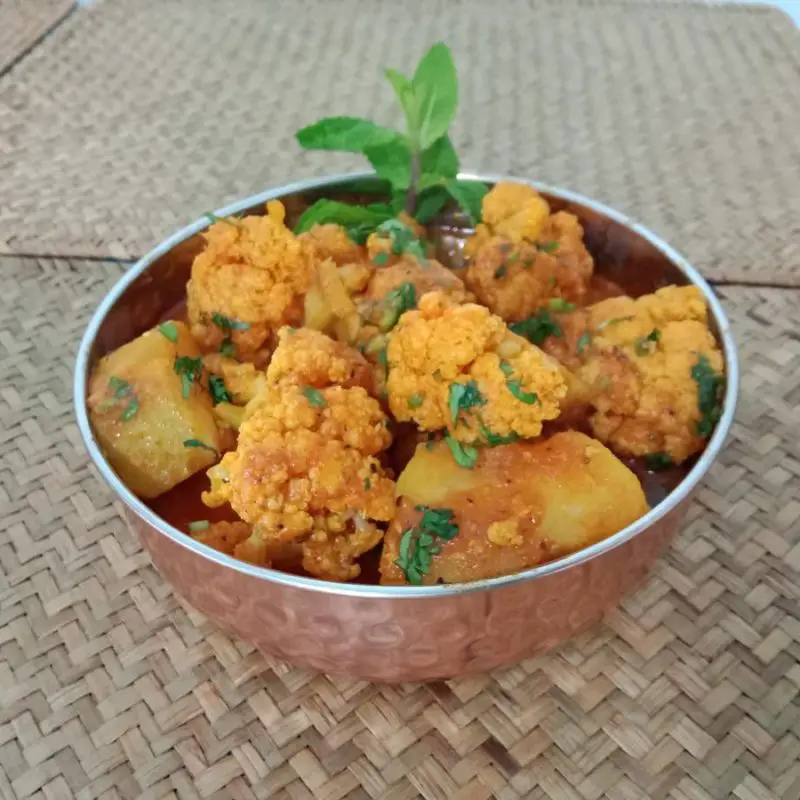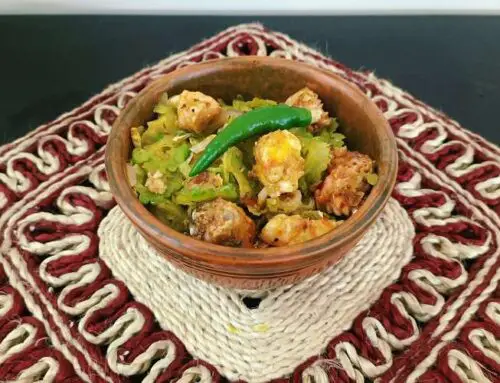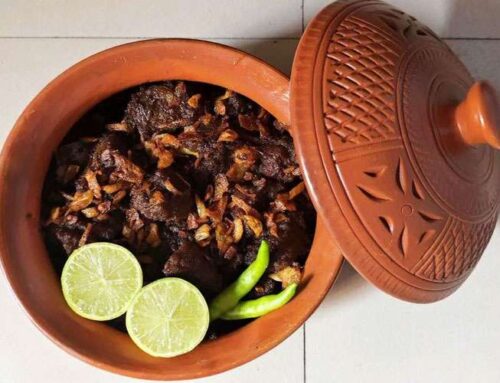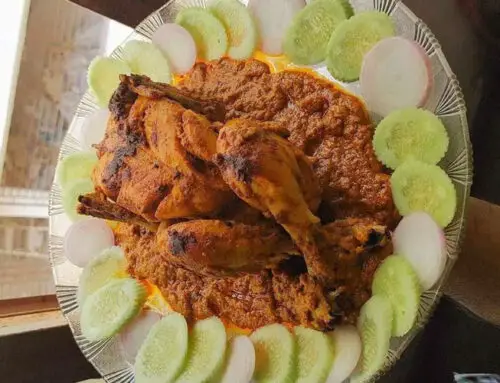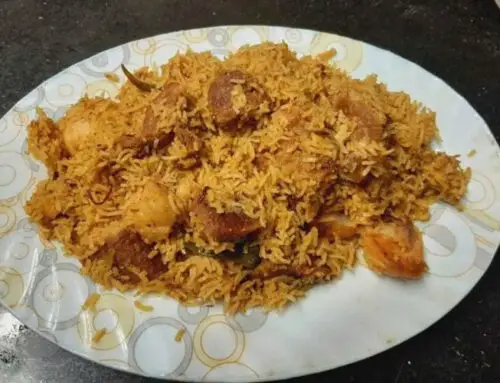“Dalna” or gravy curry is a popular Bengali dish, and there are many different varieties of dalna that Bengalis cook. Dalna is a Bengali vegetarian dish that is served without onion or garlic. Among all the numerous types of dalna, Aloo Phulkopir Dalna is arguably the simplest, yet it is delightfully tasty and flavorful. This is a traditional Bengali side dish made with cauliflower and potatoes, and it is a standout among vegetarian Bengali side dishes.
I didn’t get to spend a lot of time with my Dadi ( granny) in my childhood. But the only thing I remember about her is her little and lovely kitchen, which always looked and smelled beautiful. I recall a few of her distinctive recipes, one of which was Aloo Phulkopir Dalna. Steamed rice slowly combined with the dalna, cooked and served on stone cookware, with a sprinkle of lebu (lemon) juice – ah, I can still taste it on my tongue!
Aloo Kopir Dalna is a completely vegetarian dish. Phulkopi is the Bengali word for cauliflower; aloo is the Bengali word for potato, and dalna is typically used to refer to mild curries. You’ll adore this curry on hectic workdays since it can be prepared only in 30 minutes.
Cauliflower and potatoes are an incredible combo! It is my all-time favorite dish for winter.
Mom used to make this cauliflower curry for our lunch boxes when we were kids. She would make it less gravy so that it wouldn’t leak.
Although she likes to serve this stew with rice, I prefer it with roti. The chunky cauliflower offers a mouth-watering bite, while the potatoes enhance the taste furthermore. As a result, you get a mouthful of wonderful, well-balanced curry!
There are several ways to combine these two favorites. Stir fry to produce a delicious side dish.
One of my favorite go-to dishes is Aloo Gobi in North Indian cuisine. Similarly, this Bengali Style Cauliflower Potato Curry, called Phulkopir Aloo Dalna, is a milder variant.
Cauliflower is a winter vegetable in Bangladesh. This is why Aloo kopir Dalna is mainly cooked throughout the winter months. The cauliflower and potato curry mixture combines nicely with parata, ruti and also regular hot rice. This spicy vegetable is cooked and consumed with great delight in both North India and Bangladesh. Tomato pickle with such a range of flavorful spices enhances the flavor of this veggie.
There are different ways to cook aloo kopir dalna. This fulkopi, or cauliflower dish, is not only popular for its flavor but also for its quick and easy cooking process.
This meal is prepared differently in each family. You may add tomatoes and extra spices to make it a bit spicy.
How to serve Aloo Fulkopir Dalna for a genuine Bengali lunch
This vegetarian cauliflower curry can make a fantastic lunch or a super side dish. Aloo Phulkopir Dalna can be served with Roti, Paratha, Rice and also with Khichuri. You can add any fried fish or fish curry to this dish.
Also, with this cauliflower dish of Aloo Phulkopir Dalna, you may serve daal, lentil soup, and rice. Add some tomato chutney to the meal, and it will be a huge hit. Kids love this recipe, and the youngsters eat this with much satisfaction.
In this dish, potatoes and cauliflower are perfectly cooked in a tomato and spice-based stew. The savory flavor of the tomatoes works well with the powerful scent of the spices.
This is a typical vegetarian Bengali meal that goes well with Luchi (deep-fried puffy bread) or Gorom Bhat (steamed rice). Don’t forget to squeeze a quarter slice of Gondhoraj lebu (lemon) while eating to enhance the flavor.
You must try this delicious recipe, Enjoy this traditional Bengali delicacy, and also share it with your family and friends.
Ingredients
- 1 head cauliflower cut into florets
- 1 lb potatoes
- 3 tbsp onion chopped
- 1 tbsp coriander or cilantro leaves chopped
- 2 green chilis
- 1/2 cup tomato puree
- 1/2 cup cooking oil
- 1 bay leaf
- 2 cardamom pods
- 1 cinnamon stick
- 1/2 tsp ginger paste
- 3/4 tsp turmeric powder
- 1/2 tsp garlic paste
- 1/2 tsp coriander powder
- 1/2 tsp chili powder
- 1/2 tsp ground black pepper
- salt to taste
- 2 cups boiled water
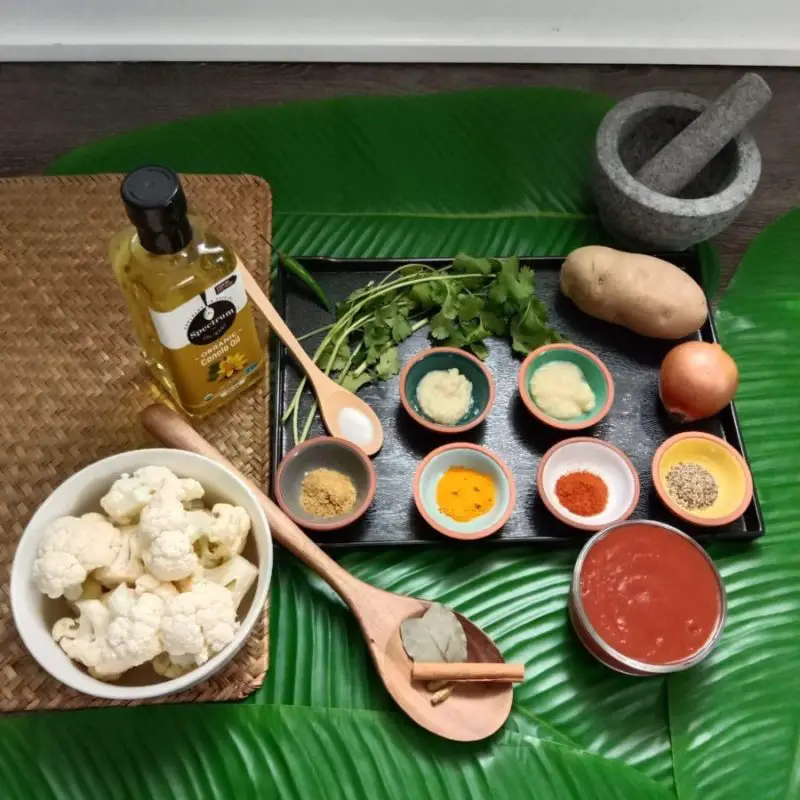
Instructions
- Peel the potatoes and cut into medium size pieces
- Cut the stem off the cauliflower and separate into medium size florets
- Add 2 tbsp of oil to a frying pan and warm until hot but not smoking. Add in the potatoes and cauliflower and fry. You can also boil the cauliflower and potato for 5 minutes or until the vegetables are half way cooked. When boiling, bring the water to boil at first with a little bit of salt and then add the vegetables. Set the vegetables aside.
- In another pan, heat oil and fry the bay leaf, cardamom and cinnamon stick.
- To the pan with the spices, add the chopped onions and salt and saute it until the onions look light brown.
- Add the ginger and garlic paste and cook until light brown.
- Add the tomato puree and cook for 3-4 minutes. Then add turmeric powder, coriander powder, chili powder, black pepper and mix it well.
- Let the mixture cook until oil rises on the surface. Add 2 cups of boiled water and cook for 2-3 minutes.
- Add the potatoes and cauliflower and stir. Make sure to stir gently so that the vegetables do not break.
- Add the green chilis then cover and cook over low heat until the vegetables are soft and the gravy is thick and the oil separates.
- Add the coriander leaves.
- Serve hot with boiled rice or luchi or paratha.
Nutrition

